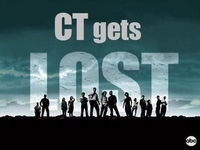
I hope you loved that episode as much as I did. Lost has always excelled at delivering mind-bending, game-changing premieres, and “LA X” proved no exception.
So much happened in this episode, I am not even going to attempt to recap it all. Instead, I’m going to focus on the theme that most intrigued me: the question of what happens to us when we die.
(WARNING: SPOILERS AHEAD. Do not read if you are not completely caught up on last night’s episode.)
After eight months of wondering whether the detonation of Jughead rebooted the timeline or created “The Incident” that ultimately led to the sequence of events chronicled in the first five seasons, we finally got our answer. “Yes.” And also, “yes.” By introducing a new narrative device, which the producers are calling the “flash-sideways,” our heroes now live in two alternate realities. In the first, Jughead’s detonation successfully rewrote significant portions of the past — now, Oceanic 815 never crashes and the plane lands in Los Angeles as scheduled. In the second, the castaways return to the “present” (2007) and pick up just moments after the detonation.
I have a few concerns about this new structure — I don’t want to spend half the season investing in a story that isn’t “true” — but it effectively returned the focus back on the characters in much the same way the flash-backs and flash-forwards did in seasons 1-3. Through the alternate timelines, we return to stories centered on the emotional growth of the characters. And what, this narrative may prompt us to ask, is “truth,” anyway? Astute observers have already noted that on the plane, Desmond reads Salman Rushdie’s Haroun and the Sea of Stories. Its famous line: ”What’s the use of stories that aren’t even true?” I have a feeling we’re about to find out.
But the truth this episode seemed most concerned with was the mystery of the afterlife. “When I die, what do you think will happen to me?” Sayid asks as he bleeds out from the gunshot wound he received in last season’s finale. He believed that nothing good lay ahead for him — the thought of his past misdeeds crippled him as he inched toward death. Locke, ever the man of faith, offers his own opinion on this spiritual reality when he offers a word of hope to Jack in the Oceanic lost and found office. “How could they know where he is?” he asks, referring to the misplaced coffin containing Christian Shepherd’s body. “They didn’t lose your father. They just lost his body.” As she lies in Sawyer’s arms, Juliet’s body seems to disconnect from her soul as she enters into another state of consciousness (“We should get coffee sometime.”). Her final thought, retrieved by ghost-whisperer Miles at Sawyer’s request, confirmed that “it worked,” a seeming confirmation that both timelines are essential to the “truth” of our castaways. I am inclined to believe that when Juliet died, her soul entered into the “alternate reality” timeline made possible by the detonation of Jughead. My theory: the coffee date she spoke of refers to her meeting and dating Sawyer back in the “real” world. Even in this alternate reality their fates, as well as those of the other castaways, are so interconnected that they end up making many of the same connections anyway.
So is the alternate timeline some kind of metaphor for the afterlife? Desmond’s “see you in another life, brother,” suggests heaven or some form of afterlife, but the phrase took on new meanings first when he actually did meet up with Jack again later in that same life (in the Hatch) and now in what appears to be an actual other life. Or, is this alternate timeline just a reroute, a do-over made possible by Jughead, on the way to a completely distinct place, a “heaven,” where the dead go when they die?
What do you think? Leave your comments below.








